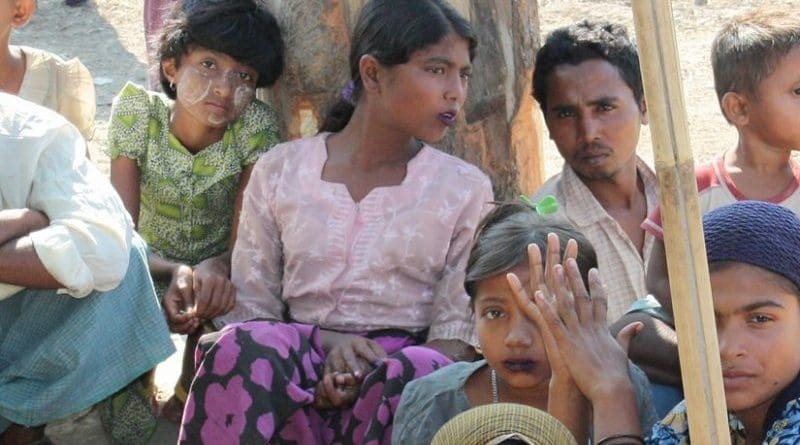Burma: 50,000 Rohingya At Risk Of Starvation As Aid Stops
By UCA News
By John Zaw
The U.N.’s World Food Program that provides regular food aid to 120,000 Rohingya from internal displaced camps, is working against the clock to deliver basic survival rations to up to 50,000 people that are now three weeks overdue.
The disruption of aid activities follows government accusations that aid agencies were supporting insurgents, that led to local contractors refusing to carry food for aid in conflict-torn Rakhine State since Aug. 25.
This has also affected the provision of primary health care to internally displaced persons (IDP) camps near Sittwe and elsewhere in the state.
Rohingya IDPs from ten camps, cordoned off by police guards near Sittwe, the port capital city of Rakhine State, say some camps received food rations in August but most of the camps did not.
The World Food Program (WFP) has regularly provided rice, beans and oil every month and local contractors carry food by trucks and send them to the camps.
Local contractors who are ethnic Rakhine are concerned about retaliation by Buddhist Rakhine hardliners following government accusations that WFP energy biscuits were found in Rohingya militant camps in northern Rakhine.
“I don’t know whether we will get aid in September but it will be very difficult for our daily survival as we totally rely on donor-provided food aid,” said Roshida, a 25-year-old Rohingya mother of three from Maw Sonywa IDP camp near Sittwe.
About 120,000 Rohingya Muslims have been relying on aid from the U.N. and INGOs since 2012 when religious violence erupted between Rohingya and ethnic Rakhine in Sittwe and surrounding areas, leaving more than 200 people dead.
Pierre Peron, a spokesperson for the U.N. Office for the Coordination of Humanitarian Affairs, said because of the disruption of activities in central Rakhine State, many people are currently not receiving their normal food assistance. He said primary health care services have been severely affected as doctors and medical staff are absent from clinics.
Peron added that a safe and enabling environment for all humanitarian staff and contractors should be ensured so they can continue their essential work to meet the needs of all communities in Rakhine State.
“Without regular access to aid and with severe restrictions on the freedom of movement of thousands of people, any disruption in humanitarian aid has a very real human impact,” Peron told ucanews.com.
Staff from international aid organizations are afraid to show up at the densely populated camps as hostilities toward aid groups are rising in Rakhine after Aung San Suu Kyi’s office repeatedly published pictures of the WFP energy biscuits allegedly found at Rohingya militant camps.
Her office said they are investigating aid groups’ support for the militants in at least one incident.
Aid agencies are routinely accused of a pro-Rohingya bias by Rakhine Buddhists and aid offices in Sittwe were sacked during 2014 riots.
Zaw Zaw Naing who is working as a community health worker at International Rescue Committee in Dar Paing IDP camp told ucanews.com that “the clinic has been closed as doctors sent by the government-run hospital don’t show up and my job is also halted.”
Zaw Zaw Naing and other local aid workers have stopped working for nearly three weeks. Meanwhile, two children who suffered from pneumonia and two elderly people who suffered from diabetes have died in the past two weeks in Thetkaepyin IDP camp.
Dosmin, a 24-year-old woman, said their five-month-old daughter died from pneumonia on Aug. 28 due to threadbare health services available in the camps.
“I brought my child to a nearby clinic but it was not an improvement because they lacked emergency equipment,” Dosmin told ucanews.com.
Still, there are signs that a broader crisis may be averted after the WFP was able to resume distribution in one camp on Sept. 12 in coordination with the government, which provided trucks, security and extra staff.
“If it all goes well, we expect that the more than 50,000 IDPs who have yet to receive their August rations will get them by the end of the week,” WFP said on Sept. 12.

